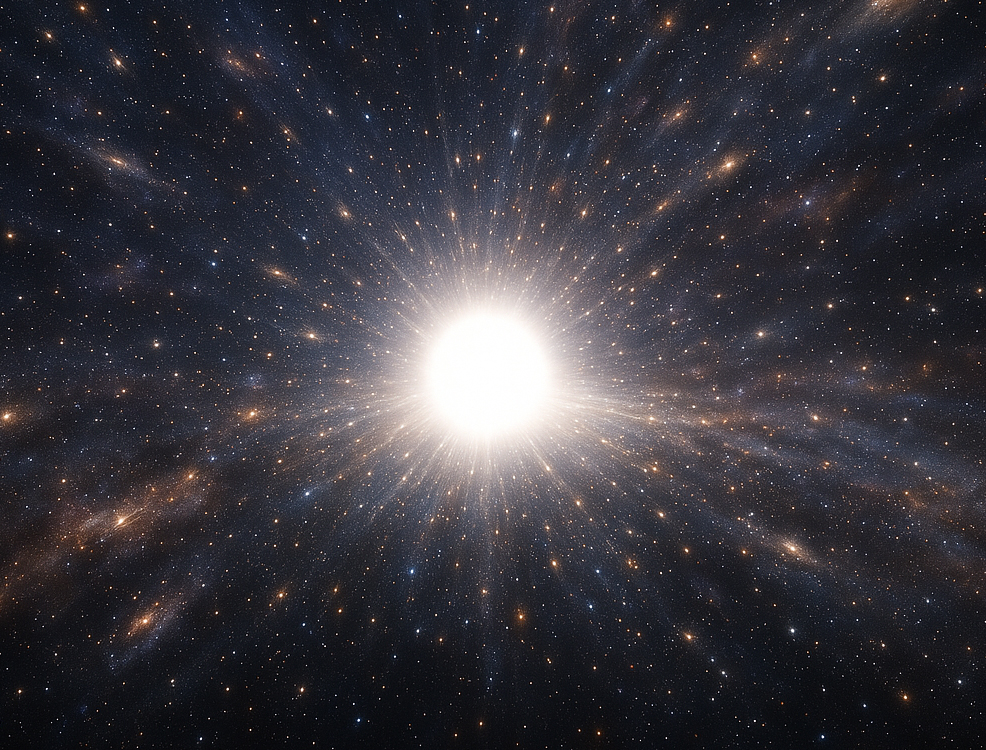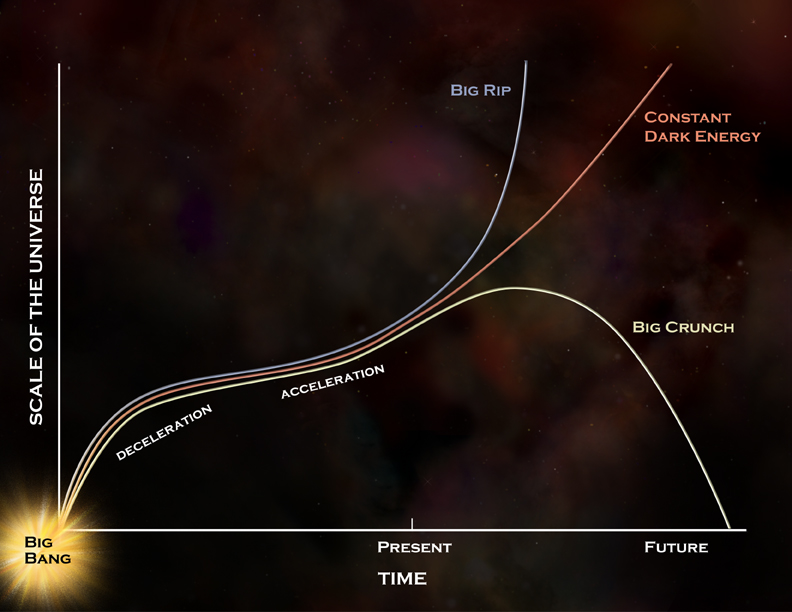
7th April 2025 "Big Crunch" universe more likely than previously thought A major survey of nearly 15 million galaxies suggests that dark energy may be weakening, potentially changing the ultimate fate of the cosmos, and increasing the possibility of a "Big Crunch" in the distant future.
For decades, cosmologists have believed that the universe will continue expanding forever, driven by dark energy – a still-unexplained force making space itself stretch faster and faster. However, new research from the Dark Energy Spectroscopic Instrument (DESI) has provided compelling hints that dark energy may be weakening over time, casting doubt on established theories and reopening the possibility of a gigantic collapse known as the "Big Crunch." Dark energy is a fundamental component of cosmology. In the current standard model, known as Lambda Cold Dark Matter (Lambda-CDM), the mass–energy content of the universe is thought to consist of about 5% ordinary matter, 27% dark matter, and 68% dark energy. This mysterious force counteracts gravity, causing galaxies to drift apart and shaping the large-scale structure of the cosmos. The Lambda-CDM model assumes that dark energy remains constant. This has led scientists to predict that the universe will continue to expand indefinitely, eventually leaving galaxies isolated in a cold, dark void. However, DESI's latest analysis suggests a more complex picture. Based at Kitt Peak in Arizona, at an elevation of 2,100 m (6,880 ft), the international project includes over 900 researchers across 70 institutions. For this study, they used data from nearly 15 million galaxies and quasars to build the largest 3D map of our universe ever made. By studying the "redshift" of these distant objects – how their light stretches as they move away from us – scientists have reconstructed the expansion history of the universe over the last 11 billion years.
Surprisingly, when combined with independent observations from supernova explosions, cosmic microwave background radiation, and weak gravitational lensing, the DESI data indicate that dark energy may not be constant after all. Instead, its influence appears to be diminishing gradually – a result first hinted at in 2024, but now considerably strengthened by the new dataset. "This is the biggest hint we have about the nature of dark energy in the approximately 25 years since we discovered it," said Adam Riess, Distinguished Professor at Johns Hopkins University and one of the original discoverers of dark energy in 1998. While the results still fall short of the "5 sigma" threshold – the level of certainty typically required for an official discovery in physics – they have now reached a statistical significance between 2.8 and 4.2 sigma, depending on the dataset combinations used. If confirmed, the evolving nature of dark energy opens up intriguing possibilities. A weakening trend might mean that the growth of our universe – instead of continuing forever – could slow significantly, eventually stabilising at a plateau or even reversing. The most dramatic scenario would see it stop expanding and then begin collapsing back in on itself, ultimately contracting into an unimaginably dense and hot state. This event, known as the "Big Crunch," would resemble the Big Bang in reverse. The alternative scenario, dubbed the "Big Rip," also hinges on dark energy but assumes it strengthens rather than weakens. In this case, dark energy would eventually tear the universe apart at its seams, ripping galaxies, stars, planets, and eventually even atoms apart. However, the DESI observations appear to favour a weakening dark energy scenario, making a Big Crunch more plausible than previously thought.
"We're guided by Occam's razor, and the simplest explanation for what we see is shifting," said Will Percival, DESI co-spokesperson and Professor of Astrophysics at the University of Waterloo. "It's looking more and more like we may need to modify our standard model of cosmology to make these different datasets make sense together – and evolving dark energy seems promising." "We're in the business of letting the universe tell us how it works, and maybe the universe is telling us it's more complicated than we thought," said Andrei Cuceu, a postdoctoral researcher at Berkeley Lab and co-chair of DESI's Lyman-alpha working group, which maps the distant universe using the distribution of intergalactic hydrogen gas. "It's not just that the data continue to show a preference for evolving dark energy, but that the evidence is stronger now than it was," said Seshadri Nadathur, Professor at the University of Portsmouth and co-chair of DESI's Galaxy and Quasar Clustering working group. "We've also performed many additional tests compared to the first year, and they're making us confident that the results aren't driven by some unknown effect in the data that we haven't accounted for." "This result about dark energy is something that we did not expect to happen in our lifetime," said Mustapha Ishak-Boushaki, Professor of Physics and Astrophysics at the University of Texas at Dallas. "As far as theoretical models, Pandora's box just opened. We were stuck with a cosmological constant. We are not stuck anymore." "Our results are fertile ground for our theory colleagues as they look at new and existing models, and we're excited to see what they come up with. Whatever the nature of dark energy is, it will shape the future of our universe," said Michael Levi, DESI Director and a scientist at Berkeley Lab. "It's pretty remarkable that we can look up at the sky with our telescopes and try to answer one of the biggest questions that humanity has ever asked." DESI is currently in its fourth year of a five-year mission. By the end of its operations, it will have measured around 50 million galaxies and quasars, providing even more precise data. Other upcoming projects – such as NASA's Nancy Grace Roman Space Telescope and the Vera Rubin Observatory in Chile – will further explore the nature of dark energy and help determine whether our understanding of the universe truly needs revision. In the meantime, cosmologists must grapple with a fascinating uncertainty. Whether our universe is destined for endless expansion or a spectacular implosion, these recent findings remind us that the cosmos still holds surprises – waiting patiently for us to uncover their secrets.
Comments »
If you enjoyed this article, please consider sharing it:
|
||||||








